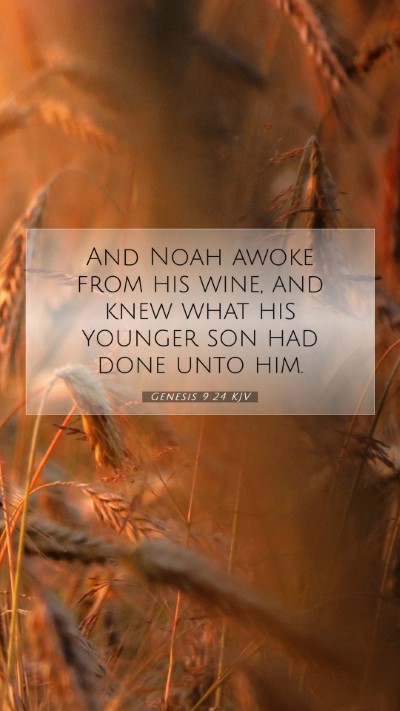Understanding Genesis 9:24
Genesis 9:24 states: "When Noah awoke from his wine and knew what his younger son had done to him." This verse captures a pivotal moment in the aftermath of the flood, focusing on the behavior of Noah's sons. The rich theological significance and moral implications of this scripture have been explored by various scholars and commentators throughout history.
Bible Verse Meanings
In studying this verse, we consider its implications for understanding human nature, sin, and the dynamics of family relationships. This scripture highlights the themes of shame, respect, and the tragic consequences that can arise from moral failings. Such interpretations are crucial for anyone engaging in Bible study insights or Bible verse commentary.
Bible Verse Interpretations
- Matthew Henry's Commentary: Henry emphasizes Noah's vulnerable state and the seriousness of Ham's actions. He discusses the lack of respect shown by Ham, which leads to grave consequences for his descendants. This reflects broader themes of sin and judgment prevalent in the Bible.
- Albert Barnes' Notes: Barnes presents the interpretation that Noah's awakening represents a moment of realization not only for Noah but also for those impacted by his sons’ actions. This serves as an important lesson on the repercussions of our behavior, particularly regarding familial relationships.
- Adam Clarke's Commentary: Clarke emphasizes the symbolic nature of this passage, viewing Noah's drunkenness as representing a loss of control that ultimately leads to disorder. Clarke’s analysis dives deeper into the cultural implications of Ham’s disrespect and its lasting impact on subsequent generations.
Scripture Analysis
This verse acts as a critical juncture in the narrative of Noah and his family. Analyzing its relationship to the broader context of Genesis allows for deeper insights into themes of historical context and moral teaching. The story highlights how misdeeds can ripple through generations, aligning with the biblical principle of sowing and reaping, which is prevalent throughout Scripture.
Biblical Exegesis
Exegetically, this verse sheds light on human nature, illustrating that even those who have witnessed divine intervention (as Noah had post-flood) are susceptible to moral failings. The implications urge believers to maintain humility and caution in their actions and choices, consistent with Bible study lessons focusing on personal conduct.
Application of Genesis 9:24 to Daily Life
In practical terms, this passage serves as a reminder to honor our family and to be aware of how our actions can impact those around us. Applying the teachings of Genesis 9:24 could involve fostering respect within our families and communities, as well as striving to recognize and mitigate the consequences of our actions.
Cross References
- Genesis 9:22: Discusses Ham’s actions that led to Noah’s indignation.
- Leviticus 20:9: Offers insight into the seriousness of dishonoring parents.
- Proverbs 30:17: A stern warning about the consequences of contempt for parents.
Conclusion
The analysis of Genesis 9:24 serves as a rich source for understanding the complexities of family dynamics, the nature of sin, and personal accountability. The combined insights from public domain commentaries reveal the multifaceted meanings embedded in this brief but powerful scripture. Whether participating in online Bible study or engaging in group discussions, contemplating the lessons from Genesis can provide deep and lasting insights on faith, morality, and the human experience.


